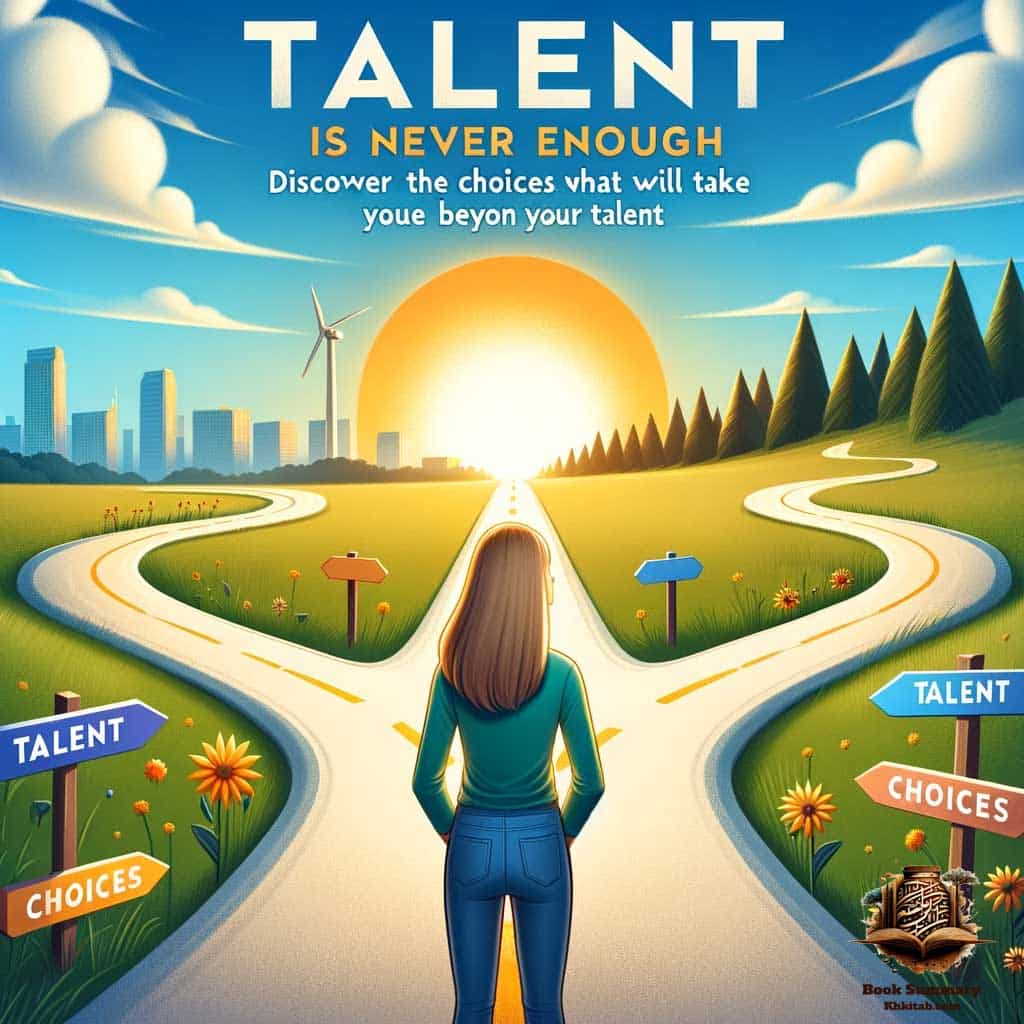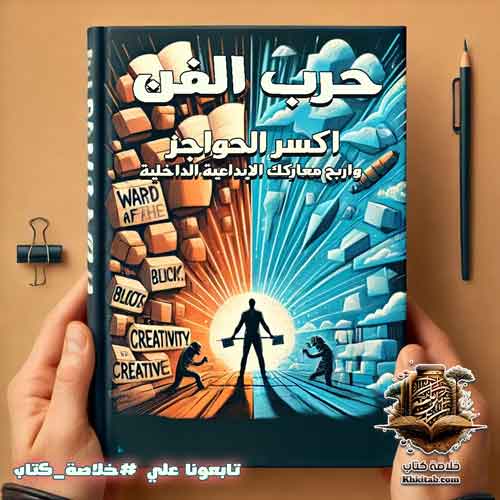
In a world where talent is often revered as the key to success, “Talent is Never Enough: Discover the Choices That Will Take You Beyond Your Talent” by John C. Maxwell offers a profound and different perspective. This work aims to shift the conventional view on talent, illustrating that talent alone, no matter how extraordinary, is not sufficient for achieving great success or sustaining it.
The book begins by acknowledging the importance of talent as a starting point but places a greater emphasis on hard work, perseverance, passion, and self-development. Maxwell uses numerous real-life examples and inspiring stories to demonstrate how ordinary individuals can achieve extraordinary feats by combining their talents with other crucial personal attributes.
Each chapter of the book delves into a fundamental concept that can enhance talent and aid in achieving success. Maxwell discusses themes such as self-belief, passion, initiative, focus, preparation, practice, perseverance, courage, teachability and growth, character, the impact of relationships, the importance of taking responsibility, and the power of teamwork.
What sets this book apart is its comprehensive approach that links talent with a range of attributes and life choices that determine individuals’ paths to success. It is not just a self-improvement guide but an invitation to deeply contemplate how we use and augment our talents most effectively. “Talent is Never Enough” is an essential read for anyone seeking to realize their full potential and looking for inspiration to transcend the traditional boundaries of innate talent and ability.
إقرأ أيضا:Emotional Blackmail: Overcoming Fear, Obligation, and GuiltHow Does Belief Enhance and Amplify Talent According to ‘Talent is Never Enough’?
In “Talent is Never Enough: Discover the Choices That Will Take You Beyond Your Talent,” John C. Maxwell presents a compelling argument on the transformative power of belief in elevating one’s talent. The book emphasizes that while talent is a significant asset, it’s the belief in oneself that truly unlocks and amplifies this talent. This concept is crucial for anyone striving to maximize their abilities and reach new heights in their personal or professional life.
Maxwell’s exploration of the theme “Belief Lifts Your Talent” revolves around the idea that self-confidence is a critical catalyst for talent. He suggests that talent alone, no matter how pronounced it is, can remain underutilized without the driving force of belief. This belief isn’t just a superficial sense of self-assurance; it’s a deep-rooted conviction in one’s abilities and potential. This conviction empowers individuals to push beyond their comfort zones, take risks, and strive for goals that might seem unattainable.
The importance of belief is further exemplified through various examples and anecdotes that Maxwell shares. These stories illustrate how individuals, from different walks of life, have harnessed the power of belief to enhance their natural talents. Whether it’s in the arts, sports, business, or any other field, the common thread is clear: those who combine their talents with a strong belief in their capabilities tend to achieve more and go further.
Maxwell also delves into the psychological aspect of belief and talent. He explains how a strong belief in oneself can change one’s mindset, leading to a more positive outlook and a greater willingness to undertake challenges. This shift in attitude is essential, as it directly influences one’s performance and the ability to capitalize on their talents. The book underscores the notion that belief acts as a multiplier of talent, turning potential into actual success.
Moreover, Maxwell doesn’t just identify the problem but offers practical advice on how to build and nurture this belief. He emphasizes the need for continuous personal development, learning from failures, and surrounding oneself with supportive and positive influences. These strategies are vital in maintaining and strengthening the belief in one’s talents, especially in the face of setbacks and challenges.
In conclusion, “Talent is Never Enough” compellingly illustrates that belief in oneself is not just a nice-to-have quality but a crucial component in making the most of one’s talent. It’s a message that resonates across all spheres of life, urging individuals to believe in their capabilities as they work towards realizing their full potential. This insight from Maxwell is a powerful reminder that with belief, the ceiling of what one can achieve with their talent is virtually limitless.
Our Facebook Page – Book Summary
How Does Passion Fuel and Maximize Talent According to ‘Talent is Never Enough’?
In John C. Maxwell’s influential book, “Talent is Never Enough: Discover the Choices That Will Take You Beyond Your Talent,” a significant emphasis is placed on the role of passion as a key enhancer of talent. This section of the book delves into how passion not only complements talent but is often the critical element that propels it to its highest levels of expression and effectiveness. Understanding this concept is pivotal for anyone seeking to fully realize their potential and harness their innate abilities to the fullest.
Maxwell approaches the subject of passion with the understanding that talent, while inherently valuable, can remain dormant or underutilized without the spark of enthusiasm and vigor that passion provides. He argues that passion is the fuel that drives individuals to go beyond the mundane and to push the boundaries of what their talents can achieve. Passion infuses talent with energy, vitality, and a sense of purpose, transforming routine tasks into opportunities for innovation and creativity.
The book illustrates this through various examples and stories, highlighting how individuals in diverse fields have leveraged their passion to amplify their talents. These narratives showcase not just the transformation of talent into remarkable accomplishments but also how passion can sustain individuals during challenging times. Whether it’s in business, arts, sports, or any other field, the presence of passion is consistently linked with higher levels of achievement and personal satisfaction.
Maxwell also explores the symbiotic relationship between passion and persistence. He points out that passion is more than just initial excitement; it’s a deep, enduring commitment to a cause or activity that resonates deeply with an individual. This enduring aspect of passion is what helps people persevere through obstacles and setbacks. It’s the driving force that keeps them engaged and motivated even when faced with difficulties.
Furthermore, the book offers insights on how to cultivate and nurture passion. Maxwell suggests that identifying what truly excites and motivates you is the first step towards harnessing the power of passion. He encourages readers to seek opportunities that align with their deepest interests and to actively engage in activities that fuel their enthusiasm. He also emphasizes the importance of surrounding oneself with equally passionate individuals, as this can create an environment that further ignites and sustains passion.
In essence, “Talent is Never Enough” profoundly underscores the idea that while talent is a critical component of success, it is passion that truly energizes and maximizes it. The book serves as a compelling reminder that to fully exploit our talents, we must not only develop and refine them but also passionately engage with them. This combination of talent and passion is what ultimately leads to extraordinary achievements and a fulfilling journey towards personal and professional goals.
Life Sciences & Medicine – Book Summary Library (khkitab.com)
How Does Taking Initiative Activate Your Talent as Explained in ‘Talent is Never Enough’?
In “Talent is Never Enough: Discover the Choices That Will Take You Beyond Your Talent,” John C. Maxwell places significant emphasis on the concept of initiative as a critical component in activating and maximizing one’s talent. This particular section of the book addresses the vital role of taking proactive steps in leveraging and enhancing one’s innate abilities. It’s a compelling exploration for anyone looking to understand how initiative can transform their potential into tangible achievements.
Maxwell starts by challenging the common misconception that talent alone will open doors and create opportunities. He argues that while talent is a foundational asset, it is the willingness to take initiative that truly sets individuals apart and catalyzes success. The book posits that talent, no matter how great, can remain latent and underutilized if not paired with the drive to act and seize opportunities.
The discussion on initiative in the book is not just about taking any action but emphasizes the importance of deliberate, goal-oriented steps. Maxwell underscores the idea that proactive behavior involves both recognizing opportunities and creating them where they don’t seem to exist. This means stepping out of one’s comfort zone, challenging the status quo, and not waiting for the perfect moment or opportunity to use one’s talents.
Throughout this section, Maxwell uses real-life examples and stories to illustrate how taking initiative has propelled individuals to remarkable heights. These narratives showcase individuals across various industries and disciplines who didn’t just rely on their talents but took bold steps to apply, develop, and showcase their abilities. This proactive approach often led to breakthroughs and successes that might not have been possible through talent alone.
Furthermore, Maxwell provides practical advice on cultivating initiative. He encourages readers to develop a mindset that actively seeks out opportunities for growth and learning. He stresses the importance of continuous self-improvement, staying curious, and being open to new experiences. This mindset, combined with the readiness to act, is what turns talent into a dynamic force for personal and professional development.
In essence, “Talent is Never Enough” articulates a powerful message: Talent is only a starting point. It is through the exercise of initiative—taking charge, making things happen, and not waiting for opportunities—that talent truly becomes a transformative force. This insight is invaluable for anyone aiming to leverage their natural abilities and make a significant impact in their chosen field. The book serves as a reminder that in the journey to success, initiative is as important as talent itself.
How Does ‘Talent is Never Enough’ Emphasize the Importance of Focus in Directing Talent?
In the influential book “Talent is Never Enough: Discover the Choices That Will Take You Beyond Your Talent” by John C. Maxwell, a key idea explored is the critical role of focus in directing and maximizing one’s talent. This concept is especially important for individuals looking to channel their abilities effectively towards achieving specific goals or missions. Maxwell’s insights offer a deeper understanding of how focus can transform talent from a passive attribute into a powerful tool for success.
Maxwell begins by highlighting that talent alone, while valuable, is not a guarantee of success. He argues that without focus, even the most talented individuals can find themselves scattered, engaging in activities that don’t align with their ultimate goals. The essence of focus, according to Maxwell, is the ability to direct one’s talent and energy towards a defined target or purpose. This concentrated effort ensures that talent is not just a dormant potential but an active force driving towards meaningful objectives.
The book dives into the concept of focus as a means to refine and sharpen talent. Maxwell suggests that when individuals apply their talents with a clear focus, they can achieve greater depth and proficiency in their chosen fields. This focus helps in filtering distractions and aligns efforts with the most impactful activities. It’s not just about working hard but working smart, ensuring that every ounce of talent is utilized towards achieving the set objectives.
Maxwell uses compelling examples from various fields to illustrate the power of focused talent. These stories showcase how individuals, when they channel their talents towards specific goals, can achieve extraordinary results. He points out that focused individuals often outperform those with possibly more talent but less direction. This distinction highlights the transformative power of focus in leveraging talent.
Additionally, Maxwell discusses strategies for developing and maintaining focus. He advises on setting clear, achievable goals, regularly revisiting and adjusting these goals, and cultivating a disciplined approach to work. He also emphasizes the importance of staying committed to one’s path, even in the face of obstacles and distractions, which often test the resilience of one’s focus.
In summary, “Talent is Never Enough” strongly advocates for the necessity of focusing talents towards specific goals or missions. This book underscores the idea that talent, to be fully effective, requires the lens of focus to channel it in the right direction. Maxwell’s exploration of focus as a tool for harnessing talent provides invaluable insights for anyone aiming to realize their potential and achieve their aspirations. It’s a compelling reminder that in the journey to success, how you use your talent is just as important as the talent itself.
How Does ‘Talent is Never Enough’ Highlight the Role of Preparation in Enhancing Talent?
In “Talent is Never Enough: Discover the Choices That Will Take You Beyond Your Talent,” John C. Maxwell explores the indispensable role of thorough and continuous preparation in enhancing and honing one’s talent. This aspect of the book is crucial for understanding how preparation, not just raw talent, is key to achieving and maintaining success in any field. Maxwell’s insights offer a nuanced perspective on the relationship between talent and preparation, emphasizing that the latter is what truly positions talent for success.
Maxwell begins by acknowledging that while talent is an important foundation, it is not an automatic guarantee of success. He argues that talent without preparation is like an unsharpened pencil – it has the potential but lacks the fine point needed for precision. This analogy underscores the need for continuous improvement and readiness, which preparation provides. Maxwell emphasizes that preparation involves more than just practicing skills; it includes learning, planning, and adapting to new challenges and environments.
The book delves into how preparation enhances talent by instilling discipline, building confidence, and developing resilience. Maxwell points out that through consistent preparation, individuals not only improve their skills but also learn to handle pressure, overcome adversity, and adapt to changing circumstances. This adaptability is particularly important in today’s fast-paced and ever-changing world, where resting on one’s laurels is not an option.
Maxwell uses real-life examples to illustrate the transformative power of preparation. These stories demonstrate how athletes, musicians, business leaders, and other successful individuals have reached the pinnacle of their fields not just through talent, but through relentless preparation. These narratives serve as powerful reminders that talent is only a starting point, and it is the dedication to preparation that carves the path to excellence.
Moreover, the book offers practical advice on how to integrate effective preparation into one’s routine. Maxwell suggests setting specific goals, creating detailed plans, seeking feedback, and being open to continuous learning as key elements of effective preparation. He also stresses the importance of a proactive mindset, encouraging readers to anticipate challenges and prepare for them in advance rather than reacting when they occur.
In summary, “Talent is Never Enough” compellingly argues that thorough and continuous preparation is essential for enhancing and honing talent. The book makes it clear that while talent is a valuable asset, it is the investment in preparation that truly unlocks its potential. Maxwell’s exploration of this topic is an invaluable guide for anyone seeking to maximize their talents and achieve sustained success in their endeavors. It’s a poignant reminder that in the journey of personal and professional growth, preparation is as critical as the talent itself.
How Does ‘Talent is Never Enough’ Explain the Critical Role of Consistent Practice in Refining Talents?
In “Talent is Never Enough: Discover the Choices That Will Take You Beyond Your Talent,” John C. Maxwell gives profound insights into the critical nature of consistent practice in refining and improving talents. This section of the book is particularly significant for those seeking to understand the transformative power of practice in the journey of talent development. Maxwell’s analysis offers a comprehensive look at why practice is not just beneficial but essential for anyone looking to maximize their innate abilities.
Maxwell begins by challenging the notion that talent alone can lead to success. He emphasizes that while talent is a valuable asset, it is the discipline of regular practice that truly hones and sharpens these skills. The book presents the idea that talent, without the refinement that comes from practice, is like an uncut gem – it has potential but lacks the polish to truly shine. This comparison highlights the essential role of practice in turning raw talent into a finely tuned skill set.
The discussion about practice in the book revolves around its ability to not only improve skills but also to instill a mindset of continuous learning and adaptation. Maxwell points out that through consistent practice, individuals develop a deeper understanding of their craft, allowing them to innovate and adapt their talents to different situations and challenges. This adaptability is crucial in a world where change is constant, and the ability to evolve is a key determinant of success.
Real-life examples are used throughout this section to illustrate how consistent practice has been a cornerstone for individuals who have achieved excellence in various fields. These stories demonstrate that those who dedicate themselves to regular practice often surpass even those with greater natural talent but less discipline. This narrative reinforces the message that practice is a powerful equalizer in the realm of talent development.
Moreover, Maxwell provides actionable advice on how to incorporate effective practice into one’s routine. He suggests setting specific goals, establishing regular practice schedules, seeking feedback, and embracing challenges as opportunities for growth. He also emphasizes the importance of persistence and resilience, acknowledging that the path of practice is often fraught with setbacks and requires a steadfast commitment.
In summary, “Talent is Never Enough” compellingly argues that consistent practice is critical in refining and improving one’s talents. The book asserts that talent, while a starting point, achieves its full potential only through the crucible of disciplined practice. Maxwell’s exploration of this topic serves as an invaluable guide for anyone aspiring to enhance their talents and achieve excellence in their pursuits. It underscores the message that in the journey of personal and professional development, practice is as vital as the talent itself.
How Does ‘Talent is Never Enough’ Emphasize the Importance of Perseverance in Sustaining Talent?
In the insightful book “Talent is Never Enough: Discover the Choices That Will Take You Beyond Your Talent,” John C. Maxwell explores the crucial role of perseverance in maintaining and growing one’s talent. This particular aspect of the book is a pivotal guide for anyone looking to understand how persistence through challenges and difficulties is essential to fully harness and develop their talents. Maxwell’s detailed analysis provides a comprehensive view of why perseverance is not just an adjunct to talent but a fundamental component of success.
Maxwell starts by acknowledging the common misconception that having talent is sufficient for achieving success. He counters this by emphasizing that talent, while a significant starting point, requires the bolstering force of perseverance to reach its full potential. The book underscores that talent without perseverance is prone to falter in the face of obstacles, whereas talent combined with steadfastness can overcome even the most daunting challenges.
The book delves into how perseverance acts as a sustaining force for talent. Maxwell illustrates that the journey of talent development is often fraught with setbacks, failures, and discouragements. It is perseverance that enables individuals to push through these adverse circumstances, learn from their experiences, and emerge stronger. This resilience turns talent into a dynamic and evolving attribute, rather than a static quality.
Real-life examples throughout the book highlight the transformative power of perseverance. Stories of renowned figures from various fields demonstrate how their determination and persistence, coupled with their talents, led to remarkable achievements. These narratives serve as powerful testaments to the fact that enduring commitment and effort are essential for talent to flourish and yield long-term success.
Additionally, Maxwell provides practical advice on cultivating perseverance. He suggests embracing a growth mindset, setting long-term goals, and developing a habit of facing and overcoming challenges. He also emphasizes the importance of adaptability and learning from failures, viewing them not as endpoints but as stepping stones to greater proficiency and mastery.
In summary, “Talent is Never Enough” compellingly argues that perseverance is key to sustaining and growing talent. The book effectively communicates that while talent is a valuable asset, it is the continuous effort and determination to persevere through challenges that truly unlock and expand its potential. Maxwell’s insights on perseverance offer invaluable guidance for anyone aiming to leverage their natural abilities and achieve sustained success in their endeavors. It’s a critical reminder that in the journey of personal and professional development, perseverance is as vital as talent itself.
How Does ‘Talent is Never Enough’ Address the Role of Courage in Overcoming Fears That Limit Talent?
In “Talent is Never Enough: Discover the Choices That Will Take You Beyond Your Talent,” John C. Maxwell delves into the essential role of courage in overcoming fears and barriers that can hinder the full expression and application of one’s talents. This facet of the book is particularly insightful for those seeking to understand how bravery plays a pivotal role in talent development and utilization. Maxwell’s comprehensive discussion on this subject provides a deeper understanding of why courage is not just an admirable quality but a necessary element for unleashing the full potential of talent.
Maxwell begins by confronting the reality that talent alone is insufficient in the face of fear and self-doubt. He highlights that often, the biggest obstacles to utilizing one’s talent are internal – fear of failure, fear of judgment, and lack of self-confidence. Maxwell argues that courage is the key to breaking through these mental barriers. It allows individuals to step out of their comfort zones, take risks, and fully engage with their talents, even in the face of potential failure or criticism.
The book explores how courage enables individuals to push beyond the limitations set by fear. Maxwell points out that courage doesn’t mean the absence of fear, but rather the determination to act despite fear. This distinction is crucial, as it reframes courage not as a trait possessed by only a fearless few, but as a choice that is available to all. By choosing courage, individuals can confront and overcome the fears that stifle their talents, allowing them to grow and thrive.
Real-life stories and examples in the book illustrate how courage has enabled individuals across various fields to realize their talents and achieve remarkable success. These narratives show that when people confront their fears with courage, they unlock new levels of potential and open up opportunities that were previously obstructed by fear.
Moreover, Maxwell offers practical guidance on cultivating courage. He suggests stepping into challenging situations, learning from failures, and building resilience. He also emphasizes the importance of supportive environments and relationships in fostering courage, highlighting how encouragement and positive reinforcement can embolden individuals to face their fears.
In summary, “Talent is Never Enough” effectively illustrates that courage is essential in overcoming fears that can limit the expression and application of talent. The book underscores the message that while talent is a significant asset, it reaches its highest potential when coupled with the bravery to face and conquer fears. Maxwell’s insights on courage provide valuable lessons for anyone aiming to maximize their talents and transcend the limitations imposed by fear. It’s a compelling reminder that in the journey of personal and professional growth, courage is as crucial as talent itself.
How Does ‘Talent is Never Enough’ Illustrate That Teachability Expands and Enhances Talent?
In “Talent is Never Enough: Discover the Choices That Will Take You Beyond Your Talent,” John C. Maxwell effectively illustrates the concept that teachability – being open to learning and growth – is a critical means to enhance and expand one’s talents. This aspect of the book is particularly enlightening for those striving to understand how continual learning and adaptability can significantly amplify their innate abilities. Maxwell’s exploration of teachability sheds light on its indispensable role in talent development and the pursuit of excellence.
Maxwell begins by debunking the myth that talent alone can lead to sustained success. He argues that even the most gifted individuals can reach a plateau if they are not open to learning and growth. The book emphasizes that teachability is not just about acquiring new knowledge; it’s about embracing a mindset that is continually open to new ideas, feedback, and experiences. This mindset enables individuals to evolve their talents, adapt to changing circumstances, and seize new opportunities.
The book delves into how teachability allows individuals to refine their skills and expand their capabilities beyond their initial talents. Maxwell explains that teachability involves a willingness to listen, learn, and apply new concepts and strategies. It also means being receptive to feedback, even when it challenges long-held beliefs or practices. This openness to learning and adapting is what allows talents to grow and stay relevant in an ever-changing world.
Real-life examples in the book illustrate the transformative power of teachability. Maxwell shares stories of successful individuals who have embraced a teachable attitude, showing how it has enabled them to reach new heights in their careers and personal lives. These narratives demonstrate that those who continuously seek to learn and improve often surpass others who may have started with more natural talent but lacked a teachable spirit.
Furthermore, Maxwell offers practical advice on how to cultivate teachability. He suggests actively seeking opportunities for learning, embracing challenges as learning experiences, and maintaining a humble attitude. He also emphasizes the importance of surrounding oneself with mentors and peers who encourage growth and provide constructive feedback.
In summary, “Talent is Never Enough” compellingly argues that teachability is a key factor in expanding and enhancing talent. The book makes a strong case that while talent is a valuable starting point, it is the commitment to ongoing learning and adaptability that truly unlocks its potential. Maxwell’s insights on teachability provide invaluable guidance for anyone seeking to maximize their talents and achieve their fullest potential. It’s a powerful reminder that in the journey of personal and professional development, the willingness to learn and grow is as essential as the talent itself.








